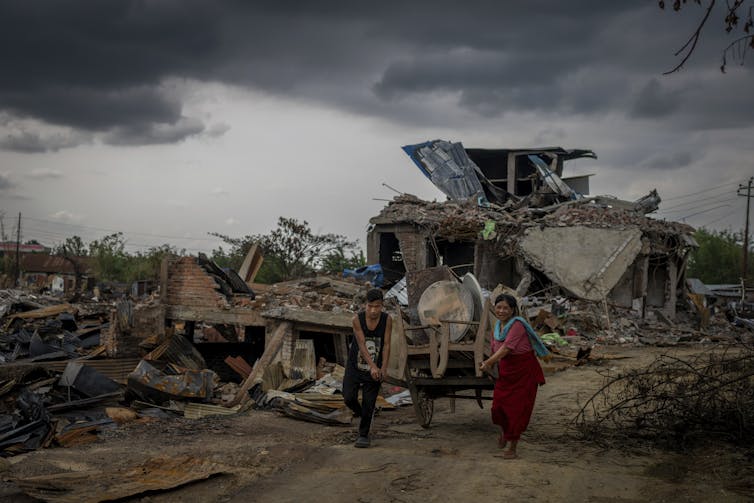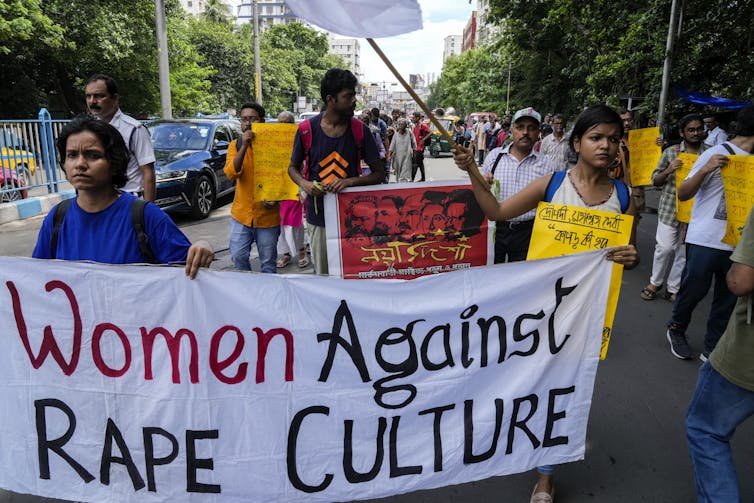[ad_1]
A mass burial for 35 folks from the Kuki tribe killed in ethnic violence in India’s Manipur state was recently put on hold after opposition from the state’s Meitei neighborhood.
The dispute over the burial website is the newest episode in an ethnic battle that has rocked Manipur. For months, Manipur in northeastern India has seen ethno-religious violence between the bulk Hindu Meitei neighborhood and the Kuki and Naga tribal communities who’re predominately Christian.
Since May, the stream of violence has claimed the lives of over 180 folks and has displaced hundreds. Despite the violence, the central authorities solely responded with statements after photos of a stunning assault on two ladies have been shared on-line.
In late July, a harrowing video emerged of two Kuki ladies being paraded bare via the streets of a small Manipur village by a bunch of males. One of the ladies was then allegedly gang-raped. News stories said the lads have been allegedly from the Meitei neighborhood.
Government inaction
Opposition Members of Parliament have introduced a no-confidence motion in opposition to Prime Minister Narendra Modi, citing his authorities’s failure to answer the violence.
After the video was broadly shared on-line, and greater than two months after the violence first broke out, Modi lastly made an announcement. He known as it a “shameful incident,” and stated state governments ought to strengthen their authorized methods to guard India’s “mothers and sisters.”
However, his assertion additionally included examples of violence in states run by the opposition, and didn’t condemn the violence extra broadly. The parliament has been in session since July 20, but the prime minister has yet to make an appearance to discuss the situation in Manipur.
Many of India’s political elite have remained deafeningly silent or have engaged in whataboutism. When the Minister of Women and Child Development, Smriti Irani, was questioned in parliament concerning the violence in opposition to ladies in Manipur, she evaded responsibility and pointed to violence in opposition dominated states.
This most up-to-date incident is yet one more indication of India’s indifference in the direction of violence in opposition to ladies. The present administration has additionally been clear and constant in its apathy in the direction of marginalized and minority communities.

(AP Photo/Altaf Qadri)
The ladies within the video have since filed a petition with the Supreme Court of India. Lawyers representing them have alleged that police collaborated with the perpetrators. In an announcement, the Indian Supreme Court stated violence in opposition to ladies in Manipur has reached an “unprecedented magnitude.”
What’s behind the violence
Manipur is a small state of round three million folks within the northeast of India bordering Myanmar. Manipur’s proximity to worldwide borders with Myanmar has made it liable to insurgency and battle. Instances of ethnic violence are sometimes attributed to a long time of unresolved strife between varied tribal and non-tribal teams.
This ongoing violence was triggered by the Manipur High Court’s decision in April 2023 to incorporate the state’s majority Meitei neighborhood within the checklist of Scheduled Tribes. Categorizing a bunch as a Scheduled Tribe gives members of the group with particular constitutional safeguards — a minimum of on paper.
The Meitei neighborhood performs better than different ethnic teams in Manipur on many social indicators, corresponding to entry to employment and academic alternatives.
Kuki and Naga tribal communities fear that if the Meitei are categorized as Scheduled Tribes, that might strengthen their already higher political affect within the state. The tribal communities additionally concern it might enable Meiteis to buy land and settle in Kuki areas.
This strife has led to church buildings being burned, sexual violence, killings and different atrocities.
In response to the outbreak of violence in May, the Manipur state authorities shut down internet services. The order issued by the federal government learn that “anti-social elements” have been utilizing social media to incite the “passions of the public” and it was a needed measure to cease the unfold of disinformation.
Arbitrary web shutdowns for all kinds of causes have change into all too common, regardless of a 2020 Supreme Court of India ruling that declared suspending the web a “drastic measure” that state governments should make use of provided that “necessary and unavoidable.”

(AP Photo/Bikas Das)
Why has Manipur been ignored?
The states of northeastern India have lengthy been seen as developmentally and geographically peripheral by the central authorities. States like Manipur have been subjected to “neocolonial governance” and haven’t benefited from social, political or financial improvement as a result of they’re usually seen as “amorphous shadowlands” inside India.
People within the area have usually been neglected and positioned as outsiders by the remainder of India. Successive central governments have usually seen these within the northeast as objects to be militarized, policed and disciplined. Manipur has additionally been subjected to abusive legal guidelines such because the Armed Forces Special Powers Act, which grants the Indian Armed Forces particular powers to take care of order in “disturbed areas.” This militarization has contributed to perpetual violence within the area.
India’s democratic veneer has helped it evade worldwide scrutiny for the continued ethnic violence in Manipur. International outrage at what has occurred in Manipur has been minimal.
Read extra:
India is using the G20 summit to further its settler-colonial ambitions in Kashmir
In reality, Modi obtained a crimson carpet welcome within the so-called bastions of democracy, specifically the United States in late June and France in mid-July.
In response to a query from a reporter about declining respect for human rights and democracy, Modi responded that democracy is in India’s DNA and has been delivered for all no matter caste, creed, faith and gender.
Modi’s go to to France in July to pen new defence deals coincided with European Parliament’s adoption of a resolution urging Indian authorities to take motion to cease the violence in Manipur. However, there was no push again from the French president.
If states just like the U.S. and France really imagine in human rights, they need to take a a lot stronger stance on India’s draconian shift in the direction of authoritarianism and illiberalism.
[adinserter block=”4″]
[ad_2]
Source link